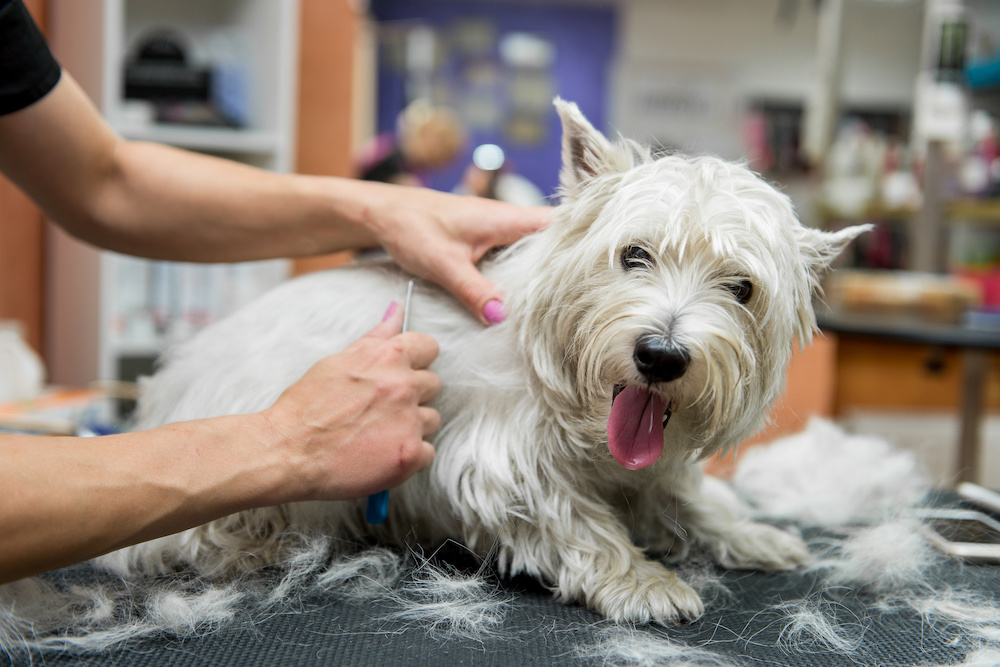When you have made the decision to own a dog, there are hundreds of breeds to choose from. Plenty of families love the idea of owning a Westie because although they may be small, they have a substantially large personality. Westie skin problems are important to consider prior to adopting one.
Westies are prone to a variety of allergies, even though they may be hypoallergenic to their owners. Being aware of the common Westie allergy symptoms and how you can remedy them for the least possible discomfort is important for all Westie pet parents.
For us, knowing about Westie allergies became really important about a year and a half after we got Sami, our westie, when his allergies started to flair up. We initially thought Sami doesn’t have allergies, but then we learned that most allergies appear after one and a half, two years of life. Here’s an article about our own experience managing Sami’s allergies.
Also, below is a video I’ve made about all the things I take with us when we travel with an allergic Westie (Sami):
Table of Contents (click to expand)
Are Westies Hypoallergenic?
Are Westies hypoallergenic? Yes, they are! They are one of the best breeds to consider if you’re prone to sneezing, coughing, and itching as a result of dogs being around your own space.
The main feature of a Westie that makes them hypoallergenic is that they shed very little. It’s highly recommended that you wash them at least once a week, however, to keep any dander at bay.
A few other important traits of a Westie to consider include:
-
Westies are Independent
Similar to many other types of dogs, these small Scottish terriers are fiercely independent. Nevertheless, they have a soft side when it comes to their family. They are known to be phenomenal people-pleasers, but at times, they also like to head off onto their own paths.
-
Westies are Friendly and Alert
If you’re interested in owning a dog that will always keep you aware of your surroundings, this is one breed to consider. Westies are seemingly always alert to movement and new people in the home. With that said, they are also notoriously friendly, which makes them great for introducing to new family members.
-
Westies are Adventurer
It’s highly recommended that unless you have thoroughly trained your Westie, you only unleash them in an enclosed area where you can control where they run off to. Otherwise, they will have the tendency to get distracted by plenty of other animals and take off before you know it. As they are incredibly small, they are also fast, which makes them nearly impossible to catch.
-
Westies are Assertive and Confident
If you have other pets in the home, know that this breed will likely work better with other dogs than most other terriers. However, you may have a little difficulty with bossiness and their assertive personality. This is especially true if you’re welcoming a new Westie into your home of the same sex as your existing dogs.
Back to our original question, are Westies hypoallergenic? Again, they absolutely are. With that said, it doesn’t mean that they will prevent every type of allergy, and every pet parent is different than the next. They are just far less likely to trigger your allergies than other breeds of dogs you may find at the shelter. However, little do most know that Westies are more prone to allergies compared to their owners.
The Most Common Westie Allergy
Unfortunately, for a pet that is such a great companion for people with allergies, Westies are prone to suffer from a few different types of allergies that can be quite difficult and uncomfortable for them to live with. Below is the most common type of Westie skin problem you may come across and need to treat over their lifetime.
Dry Skin
By far, the most common Westie allergy is dry skin, which can lead to the development of severe dandruff. You’ll begin to notice large red blotches on your pet’s skin, and they will begin to scratch and gnaw at themselves in an effort to relieve the itchiness. You might find that treatments for this ailment can be found within dandruff-related products.
The only positive side to dry skin is that it’s relatively easy for professionals to treat, and you may even be able to do it on your own. Your veterinarian will often prescribe a special shampoo that you will have to use once to twice a week in order to eliminate any dry patches on your Westie. They may also provide you with a list of tips to help you remedy the overall condition of their skin.
The best way to understand dry skin in a Westie is to think about a human with dandruff. When your scalp is particularly dry, it is prone to flaking. Over time, continually scratching the affected area can lead to redness and lesions. By using the assistance of your vet, you can eliminate dandruff and discomfort for your small pet.

Other Common Westie Allergies
Even though dry skin is clearly the most common allergy for Westies, there are a few others to take note of as well. These are all very important to take note of, as they may require you to take frequent trips to the vet or to purchase specialty items to keep your Westie calm and comfortable for its lifetime.
The other common Westie allergies to note are the following:
1. Food Allergies
It’s important to remember that nearly any type of dog can have food allergies, similar to humans. Just because one pet is allergic to certain ingredients in their food doesn’t mean all dogs will be! However, Westies are more prone than others to establishing food allergies, which is difficult to see your pet go through.
You may notice that your Westie has developed skin lesions but that they’ve also been dealing with consistent diarrhea and stomach upset. If this is the case, you will want to consider switching their food to blends that are designed for pets prone to allergies.
A few of the most common ingredients dogs can be allergic to include:
- Dairy
- Wheat
- Beef
- Chicken
- Egg
- Soy
- Lamb
- Pork
- Fish
- Rabbitvvv
By seeking advice from your veterinarian, you’ll be able to figure out what the root cause of their food allergies is. There is also the likelihood your Westie is allergic to more than one ingredient, which means they will need specially designed hypoallergenic food prescribed by your veterinarian.
2. Environmental Allergies
Environmental allergies are much more difficult to deal with than food allergies, especially with your dog. This is because they are relatively unavoidable, and switching your pet’s diet won’t make much of a difference. Instead, you will have to treat the symptoms as they are presented.
Much like how humans treat their own environmental allergies, it’s most likely you’ll be giving your dog antihistamines during specific times of the year or whenever their allergies seem to act up the most. Most veterinarians will be able to prescribe you a specific antihistamine as well as recommend the ideal dosage for your pet to help eliminate scratching and discomfort.
There are also more severe treatments, depending on how difficult your dog’s allergies are to live with. Some veterinarians may find that regularly exposing your dog to their environmental allergen can help them to establish the antibodies required to prevent being affected.
3. Atopic Dermatitis
When noticed for the first time, you may assume atopic dermatitis is simply dry skin, when in fact, it’s a much more serious ailment that will require immediate treatment. As a topical skin disease common in approximately 25% of all West Highland white terriers, the discomfort comes from severe irritation and skin damage. If not treated, Westies can be prone to severe skin irritation and infections.
How atopic dermatitis manifests depends on the dog, as some may be itchy all over their body while others may only experience itchiness in certain areas. More often than not, your dog will have large, swollen, red patches of skin as a result of consistently scratching and rubbing their skin. What makes this condition so dangerous is the fact that your dog’s itching can lead to open wounds, which, in turn, may lead to skin infections.
There are a few different treatments for this type of allergy, but they can be quite expensive for pet owners and will require treatment for the entirety of the dog’s life. The severity of the itchiness will lessen or get stronger over time, and some flare-ups may be less intrusive than others. In all truth, up to 10% of all dogs deal with atopic dermatitis over their lifetime.
4. Hyperplastic Dermatosis
Compared to atopic dermatitis, hyperplastic dermatosis is an incredibly rare ailment in Westies, but it has only ever been identified in this breed. What makes this illness so concerning is that, over time, it progresses to be worse and worse. Researchers have found that it’s an illness that will develop along a single bloodline of the Westies.
For example, if you purchase a dog from a breeder and it has hyperplastic dermatosis, it’s likely the other dogs in the same litter will as well. Researchers have found that the predisposition for the disease is inherited, but it’s likely to remain hidden until it is triggered by a yeast infection or allergy.
The most common symptoms of hyperplastic dermatosis include lumpy, bumpy, and scaly skin. It’s very likely your Westie will lose a lot of their hair due to their overwhelmingly dry skin. Although it may present itself as a mild irritation at first, it will quickly progress into an overwhelming and severe condition.
5. Yeast Infections
Another important skin condition to take note of as someone who owns a Westie is a yeast infection. This skin condition is very common in plenty of dog breeds, and it will require immediate treatment, similar to the other conditions on this list. You will likely need help from your vet to properly treat a yeast infection, as they are tough to manage on their own.
Westies are specifically affected by yeast known as Malassezia, and it can lead to intense itching, severe hair loss, a very unpleasant odor, and crusty skin that is also black and oily in appearance. You may also find that your Westie may be dealing with ear infections at the same time as their itching skin.
The largest disadvantage to a yeast infection on a Westie is that it can occur as a result of any trauma to the skin, ranging from a scratch from allergies to a minor wound. If your dog is harmed in any way, you must seek assistance from a vet to help prevent a yeast infection from developing.
6. Hot Spots
Incredibly difficult to treat and diagnose on your own, hot spots always need medical attention and urgent care. Hot spots tend to manifest as red spots all over the skin as a result of bacterial infections. These infections make their way into the skin because dogs will scratch at itchy spots and allow dirt and bacteria into open wounds.
Hot spots are typically very painful, rather than itchy, and at times, dogs may pull out their hair in the affected area due to the significant discomfort they experience.
If your Westie begins to present signs of hot spots, it is highly recommended you take them to a veterinarian as soon as possible. This will ensure they receive the correct treatment to avoid an ample amount of discomfort and pain.

Top Westie Allergy Remedies
Now that you are well versed in the most common allergies Westies will experience over their lifetime, you will also need to take possible treatments and remedies into account. More often than not, your veterinarian will be able to prescribe the right treatment based on your allergy, but at times, you may be able to treat ailments on your own.
1. Topical Ointments
When dealing with dog allergies, you will be given a topical ointment to apply to the affected area on your pet’s skin. For example, if they are scratching the top of their paw and developing a rash, you will have to apply the topical ointment as necessary.
Most topical ointments prescribed by your veterinarian will also have antibiotics, which give them the ability to ward off infections and fight severe signs of skin irritation and discomfort. If your Westie has mild allergies, you won’t need to worry about antibiotic ointments as natural and holistic remedies could work as well as great Westie allergy remedies.
For example, this includes topical ointments filled with natural nourishing properties that will reduce redness and soreness from allergies. By applying these creams and solutions daily, you can limit the amount of discomfort your dog experiences.
2. Oral Medications
Depending on the severity of your Westie’s allergies, you may also be given oral medications either in the form of capsules or liquids. Most pet parents prefer to mix oral medications with their dog’s food, as it gives them the daily protection they need from allergies very easily.
Oral medications may come in the form of antibiotics or antihistamines, depending on the illness your pet is dealing with. Antihistamines are highly recommended for generic allergies, whereas antibiotics may be an alternative treatment for infections and more severe allergies that lead to open wounds and sores.
The most common oral medications for Westie allergy remedies include Clavamox, Baytril, and Cephalexin as antibiotics. Ketoconazole is highly recommended as an antifungal.
3. Immune Therapy Shots
A more unique method of treatment that is typically reserved for dogs with very severe allergies is immune therapy. The basis behind this treatment is that it gives your dogs the ability to be exposed to their allergens so that they can build up a resistance.
Typically, the allergen will be administered in controlled doses by your veterinarian. This will then allow your dog to become desensitized to their allergy triggers. However, it is important to note that this treatment is likely very expensive and only recommended for serious allergies.
4. Medicated and Non-Medicated Shampoos
We all know how important it is to make sure your pets are bathed regularly, especially if they are dealing with skin allergies. With the help of medicated shampoos, you can topically treat allergies, especially if your dog is dealing with them all over their body. You will have to acquire a prescription from a veterinarian to acquire most medicated shampoos.
An alternative is to find over-the-counter shampoos that are designed for your dog’s specific allergies. For example, you can find a shampoo that is proven to be beneficial for atopic dermatitis. There are plenty of manufacturers that include organic and medicated ingredients to their shampoos so you can safely control itchiness, flaky skin, and dryness.
5. Dietary Changes
One of the treatments we discussed earlier is a change in diet, especially if your pet is prone to different types of food allergies. It is recommended you talk to your vet and have an allergy panel conducted so that you can get an idea of what ingredients your dog is directly allergic to. You can then start to develop a healthy eating plan that won’t upset their stomach.
There is also the possibility of purchasing specially designed foods that are meant for dogs with more than one food allergy. However, you’ll have to obtain these brands directly from a vet, which makes them more expensive than most other types of dog food.
Depending on your budget, you may find it more preferable to make your own dog food without any allergens than settling for pre-made prescribed food.
6. Soft Brushing
When you are taking the time to treat your dog’s ailments by giving them a thorough bath with their medicated shampoo, you will also want to take the time to gently brush their hair. Soft brushes are made out of boar bristles but are still soft enough that they won’t interfere with the integrity of your Westie’s skin.
When shampooing, use the soft brush to work the medicated ointment into their skin. An added benefit of these brushes is that they help to work away dead lipids from the surface of the skin, which allows healthier lipids to make their way to the surface.
These brushes are also essential for nourishing thick skin and to improve the length of time sores will take to heal. Not only will this help to remove any dead hair and skin cells, but it will also encourage your Westie to heal faster from their allergies.
Tips for Grooming Your Westie
If you have the intention of taking care of your Westie’s grooming needs at home, you’re not alone. More and more pet parents are beginning to take on the responsibility, as it’s a fantastic bonding experience and slightly less expensive than using a professional groomer.
With the correct grooming techniques, you can limit allergies, discomfort, and itchiness over time. As a dog breed that is inherently prone to allergies, these are our favorite grooming tips that can help to keep your Westie’s skin discomfort and itchiness at bay.
Tip 1: Daily Brushing
Westies have fantastically thick coats, and their double coats can be difficult to work with, especially for first-time pet owners. You’ll want to make sure you have a brush that is designed for their hair thickness, and that will target the underlayers to remove dead hair and any debris.
The more efficient you are with brushing your dog’s hair daily, the less likely they will be to cause allergies. In addition, you’ll find that regular brushing prevents knots and mats, which helps to prevent skin allergies for your Westie as well.
Tip 2: Clipping
Another important aspect of maintaining your Westie’s coat is to either clip or strip their coat. When stripping, you will be removing dead hair with your hands, which can transform their coat into a more wiry texture. Clipping is slightly more time consuming but will create a softer coat, which is recommended for dogs with skin allergies.
By using high-quality electric clippers that are specifically designed for dogs, you will want to remove excess hair from your Westie. You must pay close attention to the sensitive areas of their body, as you won’t want to bald them. In addition, use scissors around their face and head to prevent accidental cuts.
Over time, your dog will become more comfortable with the idea of clipping and using electric clippers, which should make them easier to manage. Then again, if you have a Westie that isn’t a fan of being groomed, it may be a better alternative to leave them in the hands of a professional.
Tip 3: Weekly Baths
This is especially important if your Westie is suffering from a skin condition, as weekly baths will help to make sure their skin receives a regular dose of medication to prevent swelling, itchiness, and discomfort. Listen to the advice of your vet when they give you the prescribed shampoo, as it will come with application instructions.
Make sure you have a rubber mat installed on the bottom of your bathtub, as Westies are highly active and are prone to slipping when being bathed. You will also want to consider using mildly warm water with a detachable showerhead, so you can have full control over where the water is applied.
With the help of your medicated shampoo, your Westie will begin to look forward to bath time, as it will help them deal with their specific skin condition.
Tip 4: Nail Clipping
This is another important aspect of grooming if you’re looking for Westie allergy remedies. Dogs don’t quite scratch like humans do, as they are likely to use their mouths, but by ensuring your dog’s nails are clipped, you’re limiting their chances of cutting open their skin and creating sores from scratching.
This is easily one of the most difficult parts of grooming a Westie, as cutting a nail too short can permanently damage your pet. Ideally, you’re going to need a pair of clippers for dogs. You will also want to pay close attention that you don’t get close to the quick, as nicking the quick means you’ll be damaging a highly sensitive blood vessel in their nails. After a bath, seeing the quick is much simpler.
Tip 5: Teeth Brushing
Regularly brushing your Westie’s teeth is something that even you’ll appreciate over time, as you won’t have to deal with the stench of dog breath while cuddling with your pet. By using approved formulas for dogs, you can easily get rid of any hidden traces of food, dirt, and grime that might be trapped in between the teeth of your dog. Not only is this essential for their oral and dental health, but their overall health as well.
As mentioned, dogs have the tendency to scratch using their mouths, and the more bacteria that is built up in their mouth, the more likely it is to be transferred to their skin rashes. For a dog that is suffering from allergies, you will want to keep the affected area as disinfected as possible, which includes ensuring their teeth and mouths are as clean as possible.
Westie Skin Problems: Final Thoughts
Understanding a Westie’s allergies is the first part of being a responsible pet owner. As one of the few breeds with numerous skin concerns you will have to look out for, maintaining a proper grooming schedule with medicated shampoos is highly recommended. You will also want to ask your veterinarian to do an allergy panel so that you can be prepared for any potential allergies in the future.
As a dog breed that is highly recommended for owners looking for a hypoallergenic pet, you will still have to deal with several allergies when it comes to keeping your Westie healthy!




Will westie hair come back when allergies are under control
It should, unless the allergies were really, really bad. If you think it was the case, you should talk to a vet, just to be sure.
THANK YOU SO MUCH MY 12 YR OLD IS ONLY NOW HAVING SKIN PROBLEMS,
I ALREADY BOUGHT A BOARS HAIR BRUSH, SO I M GOING IN THE RIGHT TRACK, ALONG WITG THE MEDICATED SHAMPOOS.
YOU GAVE ME LOTS OF GOOD ADVICE AND KNOWLEDGE
My Westie was just diagnosed with allergic dermatitis-enviromental. My vet recommended either apoquel or Cytopoint. He is 2 years 9 months. They both have terrible side effects. Are there any other things u can recommend?